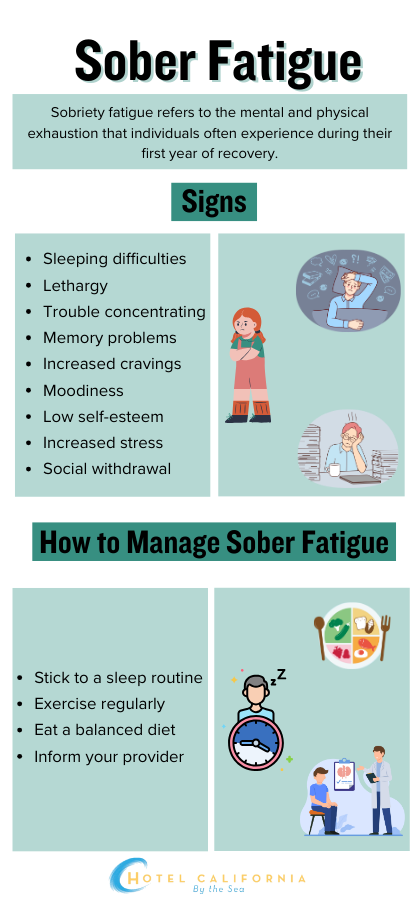What is Sobriety Fatigue?
Healing from the throws of addiction is a physically, psychologically and emotionally taxing ordeal. It can be both cognitively and spiritually draining and lead to an overall sense of exhaustion. In some cases, it can even exacerbate feelings of anxiety and depression. These feelings will most often manifest during the early stages of immediate addiction recovery and it is also known as sobriety fatigue. Sobriety fatigue is a natural reaction to the time, energy and efforts the user has invested into breaking free from and overcoming the challenges of their addiction.

Sobriety is defined as a state of being in which a person is not under the influence of mind-altering substances. It extends to behaviors and activities free from harmful behaviors. Sobriety is the choice to abstain from drugs and alcohol. Fatigue is defined as a state of physical and/or mental depletion when the mind and body are exhausted from prolonged and continuous demands. The combination of the two states of being, sobriety fatigue, creates a complex state of being that comes from the new challenges of maintaining a sober lifestyle. After being intoxicated and under the influence of drugs for so long, it can require a lot of physical and mental effort to create a sustainable sober lifestyle.
What is Sobriety Fatigue?
The initial first few weeks or months after drug use has stopped can be the most difficult to endure. Your mind and body are going through big changes and learning to adjust to a new norm. You may be feeling more tired than usual. This is because your body is so accustomed to the strain of side effects of substances, it can feel like you are finally crashing from the roller-coaster of your addiction. These feelings are what is known as sobriety fatigue. It is the state of being and time in which your body re-adjusted, re-balances and continues to rebound from your addiction.
Sobriety fatigue is a normal and common experience that occurs among many people who are post-detox and recovering from a substance addiction. It can manifest in many different ways, which include physical fatigue, tiredness, mental exhaustion, brain fog, and lack of motivation. Sobriety fatigue can also manifest in a person who is struggling to stay sober.
Sobriety fatigue can be a misunderstood symptom of recovery. Some describe it as lingering physical withdrawal symptoms when the body continues to readjust. While this is one aspect of sobriety fatigue, this is not just a physical side effect. In some cases, it can occur when a person develops stress, anxiety, depression and burnout as they try to maintain sobriety.

Symptoms of Sobriety Fatigue
- Lack of energy
- Emotional instability
- Lack of concentration
- Persistent apathy
- Increased risk of relapse
- Decreased quality of life
- Mental health challenges
- Loss of self-efficacy
- Strained relationships
- Feelings of isolation and withdrawal
- Lack of engagement
- Stagnation of personal growth
- Lack of coping skills
How long does Sobriety Fatigue last?
The time in which it takes for the body to go back to normal and produce the right amount of hormones and neurotransmitters is very dependent on each individual. Factors such as age, quantity of drug used, what type of drug used, the duration in which the drug was used as well as overall medical health can impact how long sobriety fatigue lasts. How quickly a person can bounce back physically and mentally impacts how long they will linger in sobriety fatigue. This can be weeks or months and in some extreme cases, a year. Over time, there will be fewer and fewer signs of sobriety fatigue and it will be easier for the person to live a sober lifestyle free from the hold of addiction.
Check Your Insurance Coverage for FREE
Find out if your insurance covers addiction treatment in minutes. We accept most insurance!
Factors that can cause the onset of Sobriety Fatigue
- Routine and monotony. Finally being free from addiction created an exciting new beginning. However, once the initial excitement and feeling of liberation wears off, it can be hard work building and maintaining a new routine to help you stay sober. In some cases, it can be boring and linger on the temptation of cravings and urges.
- Lack of immediate reward. Addictive substances such as alcohol and opioids deliver immediate rewards and effects. During the sober journey, the things you do and changes you make may not produce an immediate result. Recovery is a lifelong journey and a constant work in progress.
- Social Isolation. When getting sober, it can be beneficial to distance yourself from old friends who were associated with your addiction. This can make it difficult to adjust to your new life or even find and make new sober friends.
- Emotional challenges. Sobriety can bring to light underlying emotional issues that you may have been trying to suppress in the past or during your drug use.
- Relapse anxiety. During recovery, many people will experience the stress and anxiety of possibly relapsing.
- Cognitive load. During this time in early recovery, you may feel a sense of high expectations and perfectionism to maintain your sobriety. You may also feel the need to constantly stay vigilant and make meaningful decisions to stay away from drugs. This can cause a mental strain on your psyche.
- Loss of Identity. In some cases, a person has been under the influence for so long, they no longer know who they are when they are not using. This can be confusing and scary.
Ways in which you can manage your Sobriety Fatigue
- Get active and get physical. Exercising and staying physically active can help improve overall mental health.
- Take care of your mental health. Practice mindfulness and meditation. Allow yourself to feel what you need to feel and practice effective stress management techniques.
- Make important lifestyle adjustments. Create a nightly bedtime routine, build a support network of sober friends, learn a new hobby, and attend individual or group therapy.
- Have a balanced diet. Having a nutrient-dense diet will help the body physically restore itself, which in turn will make it easier to restore itself psychologically and emotionally.
- Understanding your triggers. Learn your triggers and learn how to avoid them in order to maintain your sobriety. Knowing what they are can help you remove yourself and distance yourself from situations that will trigger dangerous addiction-related behaviors.
Reach out to Hotel California by the Sea
We specialize in treating addiction and other co-occurring disorders, such as PTSD. Our Admissions specialists are available to walk you through the best options for treating your addiction.
Treatment for Substance Use Disorder
The early days of sobriety can be both emotionally freeing as well as emotionally draining. It can be some of the most difficult times of your recovery, but it is only temporary and in time your mind and body will be able to readjust to a new norm. Sobriety fatigue is one of the most frequently report conditions among people who have reached this pivotal point in their lives. Substance and alcohol addiction is extremely draining on the mind and body. Behavioral health treatment programs that specialize in substance addiction, alcohol addiction and co-occurring mental health conditions can help users overcome their dangerous relationship with mind-altering substances.
Hotel California by the Sea provides treatment care at all levels including detox, residential, PHP and IOP. We believe in evidence-proven treatments such as cognitive behavioral therapy, dialectical behavioral therapy, group therapy and family therapy. Our treatment program also provides medication-assisted treatments in combination with individual and group counseling. Hotel California by the Sea provides a holistic approach and touches on every aspect of addiction including physical, psychological and emotional factors.
References:
https://cassioburycourt.com/2024/07/sobriety-fatigue-what-is-it-how-long-does-it-last
https://theblanchardinstitute.com/what-to-expect-in-the-first-few-months-of-sobriety/
https://firststepbh.com/blog/sobriety-fatigue-why-youre-tired-after-you-quit-drinking/
https://livewellandfully.com/sobriety-fatigue/
https://sobrietyandwellbeing.com/how-long-does-sobriety-fatigue-last/
https://uncovercounseling.com/blog/sobriety-fatigue-causes-consequences/
